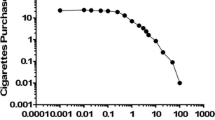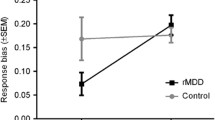Abstract
Rationale
Individuals with depression smoke more than smokers without depression. Research has shown that cigarette demand is a useful tool for quantifying tobacco reinforcement and supposes a clinical predictor of treatment outcomes. Despite previous studies examining the relative reinforcing efficacy of nicotine among different populations of smokers, to date, no study has assessed cigarette demand among individuals with elevated depressive symptoms.
Objective
The aim of this study was to compare cigarette demand among samples of smokers with low and elevated depressive symptoms. Further, it also sought to examine the relationship between depressive symptomatology and the individual CPT demand indices.
Methods
Participants (80 non-depressed smokers and 85 depressed smokers) completed the 19-item version of the Cigarette Purchase Task (CPT). Depression symptomatology was assessed using the Beck Depression Inventory-Second Edition (BDI-II). Depressed smokers needed to present at least moderate depressive symptoms as indicated by scoring ≥ 20 on the BDI-II.
Results
Depressive symptomatology and nicotine dependence were significantly associated with elasticity of demand (R 2 = 0.112; F(2, 155) = 9.756, p = ≤ 0.001). Depressive symptoms, cigarettes per day, and years of regular smoking also predicted breakpoint scores (R 2 = 0.088; F(4, 153) = 3.697, p = 0.007).
Conclusion
As smokers with elevated depressive symptoms are less sensitive to increases in cigarette prices than those with low depressive symptomatology, future studies should consider these cigarette demand indices when designing depression-focused smoking cessation treatments. Providing this difficult-to-treat population with interventions that promote both pleasurable and alternative reinforcing activities is highly encouraged.


Similar content being viewed by others
References
Acker J, MacKillop J (2013) Behavioral economic analysis of cue-elicited craving for tobacco: a virtual reality study. Nicotine Tob Res 15(8):1409–1416. https://doi.org/10.1093/ntr/nts341
American Psychiatric Association (2000) Diagnostic and statistical manual of mental disorders 4th revised edn. American Psychiatric Association, Washington, DC
Amlung MT, Acker J, Stojek MK, Murphy JG, MacKillop J (2012) Is talk “cheap”? An initial investigation of the equivalence of alcohol purchase task performance for hypothetical and actual rewards. Alcohol Clin Exp Res 36(4):716–724. https://doi.org/10.1111/j.1530-0277.2011.01656.x
Audrain-McGovern J, Rodriguez D, Kassel JD (2009) Adolescent smoking and depression: evidence for self-medication and peer smoking mediation. Addiction 104(10):1743–1756. https://doi.org/10.1111/j.1360-0443.2009.02617.x
Audrain-McGovern J, Rodriguez D, Rodgers K, Cuevas J (2011) Declining alternative reinforcers link depression to young adult smoking. Addiction 106(1):178–187. https://doi.org/10.1111/j.1360-0443.2010.03113.x
Audrain-McGovern J, Wileyto EP, Ashare R, Cuevas J, Strasser AA (2014) Reward and affective regulation in depression-prone smokers. Biol Psychiatry 76(9):689–697. https://doi.org/10.1016/j.biopsych.2014.04.018
Beck AT, Steer RA, Brown GK (1996) Manual for Beck Depression Invertory-II. Psychological Corporation, San Antonio
Bidwell LC, MacKillop J, Murphy JG, Tidey JW, Colby SM (2012) Latent factor structure of a behavioral economic cigarette demand curve in adolescent smokers. Addict Behav 37(11):1257–1263. https://doi.org/10.1016/j.addbeh.2012.06.009
Brody AL, Olmstead RE, London ED, Farahi J, Meyer JH, Grossman P, Lee GS, Huang J, Hahn EL, Mandelkern MA (2004) Smoking-induced ventral striatum dopamine release. Am J Psychiatry 161(7):1211–1218. https://doi.org/10.1176/appi.ajp.161.7.1211
Cohen J (1988) Statistical power analysis for the behavioral sciences. Erlbaum, Hillsday
Chang HH, Chiang TL (2009) Depressive symptoms, smoking, and cigarette price elasticity: results from a population-based survey in Taiwan. Int J Public Health 54(6):421–426. https://doi.org/10.1007/s00038-009-0080-4
Chase HW, MacKillop J, Hogarth L (2013) Isolating behavioural economic indices of demand in relation to nicotine dependence. Psychopharmacology 226(2):371–380. https://doi.org/10.1007/s00213-012-2911-x
Dahne J, Murphy JG, MacPherson L (2016) Depressive symptoms and cigarette demand as a function of induced stress. Nicotine Tob Res 19(1):49–58. https://doi.org/10.1093/ntr/ntw145
First MB, Spitzer RL, Gibbon M, Williams JBW (1996) Structured clinical interview for DSM-IV Axis I Disorders, Clinician Version (SCID-CV). American Psychiatric Press Inc, Washingyon, DC
González-Roz A, García-Pérez Á, Weidberg S, Secades-Villa R (2017) Contingency management and behavioral activation for smokers with depression 79th annual meeting of the College Problem of Drug Dependence. Montréal
Goodchild M, Nargis N, Tursan d’Espaignet E (2017) Global economic cost of smoking-attributable diseases. Tob Control:tobaccocontrol-2016-053305. https://doi.org/10.1136/tobaccocontrol-2016-053305
Hayes AF (2013) Introduction to mediation, moderation, and conditional process analysis: a regression-based approach. The Guilford Press, New York
Heatherton TF, Kozlowski LT, Frecker RC, Fagerstrom KO (1991) The Fagerstrom test for nicotine dependence: a revision of the Fagerstrom Tolerance Questionnaire. Br J Addict 86(9):1119–1127. https://doi.org/10.1111/j.1360-0443.1991.tb01879.x
Hitsman B, Papandonatos GD, McChargue DE, DeMott A, Herrera MJ, Spring B, Borrelli B, Niaura R (2013) Past major depression and smoking cessation outcome: a systematic review and meta-analysis update. Addiction 108(2):294–306. https://doi.org/10.1111/add.12009
Hursh SR, Silberberg A (2008) Economic demand and essential value. Psychol Rev 115(1):186–198. https://doi.org/10.1037/0033-295x115.1.186
Kassel JD, Stroud LR, Paronis CA (2003) Smoking, stress, and negative affect: correlation, causation, and context across stages of smoking. Psychol Bull 129(2):270–304. https://doi.org/10.1037/0033-2909.129.2.270
Khaled SM, Bulloch A, Exner DV, Patten SB (2009) Cigarette smoking, stages of change, and major depression in the Canadian population. Can J Psychiatr 54(3):204–208. https://doi.org/10.1177/070674370905400309
Lasser K, Boyd JW, Woolhandler S, Himmelstein DU, McCormick D, Bor DH (2000) Smoking and mental illness: a population-based prevalence study. JAMA 284(20):2606–2610. https://doi.org/10.1001/jama.284.20.2606
Leventhal AM, Trujillo M, Ameringer KJ, Tidey JW, Sussman S, Kahler CW (2014) Anhedonia and the relative reward value of drug and nondrug reinforcers in cigarette smokers. J Abnorm Psychol 123(2):375–386. https://doi.org/10.1037/a0036384
Lopez AA, Skelly JM, Higgins ST (2015) Financial incentives for smoking cessation among depression-prone pregnant and newly postpartum women: effects on smoking abstinence and depression ratings. Nicotine Tob Res 17(4):455–462. https://doi.org/10.1093/ntr/ntu193
Luger TM, Suls J, Vander Weg MW (2014) How robust is the association between smoking and depression in adults? A meta-analysis using linear mixed-effects models. Addict Behav 39(10):1418–1429. https://doi.org/10.1016/j.addbeh.2014.05.011
MacKillop J, Brown CL, Stojek MK, Murphy CM, Sweet L, Niaura RS (2012) Behavioral economic analysis of withdrawal- and cue-elicited craving for tobacco: an initial investigation. Nicotine Tob Res 14(12):1426–1434. https://doi.org/10.1093/ntr/nts006
Mackillop J, Murphy CM, Martin RA, Stojek M, Tidey JW, Colby SM, Rohsenow DJ (2016) Predictive validity of a cigarette purchase task in a randomized controlled trial of contingent vouchers for smoking in individuals with substance use disorders. Nicotine Tob Res 18(5):531–537. https://doi.org/10.1093/ntr/ntv233
MacKillop J, Murphy JG, Ray LA, Eisenberg DTA, Lisman SA, Lum JK, Wilson DS (2008) Further validation of a cigarette purchase task for assessing the relative reinforcing efficacy of nicotine in college smokers. Exp Clin Psychopharmacol 16(1):57–65. https://doi.org/10.1037/1064-1297.16.1.57
MacPherson L, Tull MT, Matusiewicz AK, Rodman S, Strong DR, Kahler CW, Hopko DR, Zvolensky MJ, Brown RA, Lejuez CW (2010) Randomized controlled trial of behavioral activation smoking cessation treatment for smokers with elevated depressive symptoms. J Consult Clin Psychol 78(1):55–61. https://doi.org/10.1037/a0017939
Mathew AR, Hogarth L, Leventhal AM, Cook JW, Hitsman B (2017) Cigarette smoking and depression comorbidity: systematic review and proposed theoretical model. Addiction 112(3):401–412. https://doi.org/10.1111/add.13604
Mendelsohn C (2012) Smoking and depression—a review. Aust Fam Physician 41(5):304–307
Murphy JG, MacKillop J (2006) Relative reinforcing efficacy of alcohol among college student drinkers. Exp Clin Psychopharmacol 14(2):219–227. https://doi.org/10.1037/1064-1397.14.2.219
Murphy JG, MacKillop J, Tidey JW, Brazil LA, Colby SM (2011) Validity of a demand curve measure of nicotine reinforcement with adolescent smokers. Drug Alcohol Depend 113(2-3):207–214. https://doi.org/10.1016/j.drugalcdep.2010.08.004
Murphy JG, Yurasek AM, Dennhardt AA, Skidmore JR, McDevitt-Murphy ME, MacKillop J, Martens MP (2013) Symptoms of depression and PTSD are associated with elevated alcohol demand. Drug Alcohol Depend 127(1-3):129–136. https://doi.org/10.1016/j.drugalcdep.2012.06.022
O'Connor RJ, Heckman BW, Adkison SE, Rees VW, Hatsukami DK, Bickel WK, Cummings KM (2016) Persistence and amplitude of cigarette demand in relation to quit intentions and attempts. Psychopharmacology 233(12):2365–2371. https://doi.org/10.1007/s00213-016-4286-x
Pizzagalli DA, Holmes AJ, Dillon DG, Goetz EL, Birk JL, Bogdan R, Dougherty DD, Iosifescu DV, Rauch SL, Fava M (2009) Reduced caudate and nucleus accumbens response to rewards in unmedicated individuals with major depressive disorder. Am J Psychiatry 166(6):702–710. https://doi.org/10.1176/appi.ajp.2008.08081201
Reid HH, Ledgerwood DM (2016) Depressive symptoms affect changes in nicotine withdrawal and smoking urges throughout smoking cessation treatment: preliminary results. Addict Res Theory 24(1):48–53. https://doi.org/10.3109/16066359.2015.1060967
Reynolds B, Schiffbauer R (2004) Measuring state changes in human delay discounting: an experiential discounting task. Behav Process 67(3):343–356. https://doi.org/10.1016/j.beproc.2004.06.003
Secades-Villa R, García-Rodríguez O, López-Núñez C, Alonso-Pérez F, Fernández-Hermida J (2014) Contingency management for smoking cessation among treatment-seeking patients in a community setting. Drug Alcohol Depend 140:63–68. https://doi.org/10.1016/j.drugalcdep.2014.03.030
Secades-Villa R, Pericot-Valverde I, Weidberg S (2016) Relative reinforcing efficacy of cigarettes as a predictor of smoking abstinence among treatment-seeking smokers. Psychopharmacology 233(17):3103–3112. https://doi.org/10.1007/s00213-016-4350-6
Spielberger CD, Gorsuch RL, Lushene RE (1970) Handbook of STAI. Consulting Psychologist Press, Palo Alto
Spring B, Pingitore R, McChargue DE (2003) Reward value of cigarette smoking for comparably heavy smoking schizophrenic, depressed, and nonpatient smokers. Am J Psychiatry 160(2):316–322. https://doi.org/10.1176/appi.ajp.160.2.316
Tabachnick BG, Fidell LS (2006) Using multivariate statistics (5th ed.). Allyn & Bacon, Inc, Needham Heights
World Health Organization (2016) Tobacco fact sheet. Retrieved January 10, 2016, from http://www.who.int/mediacentre/factsheets/fs339/en/
Acknowledgments
The authors acknowledge the smokers included in the study for their valuable participation.
Funding
The present study was supported by the Spanish Ministry of Economy and Competitiveness, the European Regional Development Fund (Grant PSI2015-64371-P. MINECO/FEDER), the Council for Economy and Work (Ref. GRUPIN14-047) awarded to the Addictive Behaviors Research Group, and by a predoctoral grant from the Spanish Ministry of Economy and Competitiveness (MINECO) (Ref. BES-2016-076663). The funding sources played no role in the study design, data collection, analysis, or interpretation of the results.
Author information
Authors and Affiliations
Corresponding author
Ethics declarations
All subjects provided informed consent prior to study initiation and this study was approved by the Institutional Review Board of the University of Oviedo.
Conflict of interest
The authors declare that they have no conflicts of interest.
Rights and permissions
About this article
Cite this article
Secades-Villa, R., Weidberg, S., González-Roz, A. et al. Cigarette demand among smokers with elevated depressive symptoms: an experimental comparison with low depressive symptoms. Psychopharmacology 235, 719–728 (2018). https://doi.org/10.1007/s00213-017-4788-1
Received:
Accepted:
Published:
Issue Date:
DOI: https://doi.org/10.1007/s00213-017-4788-1




